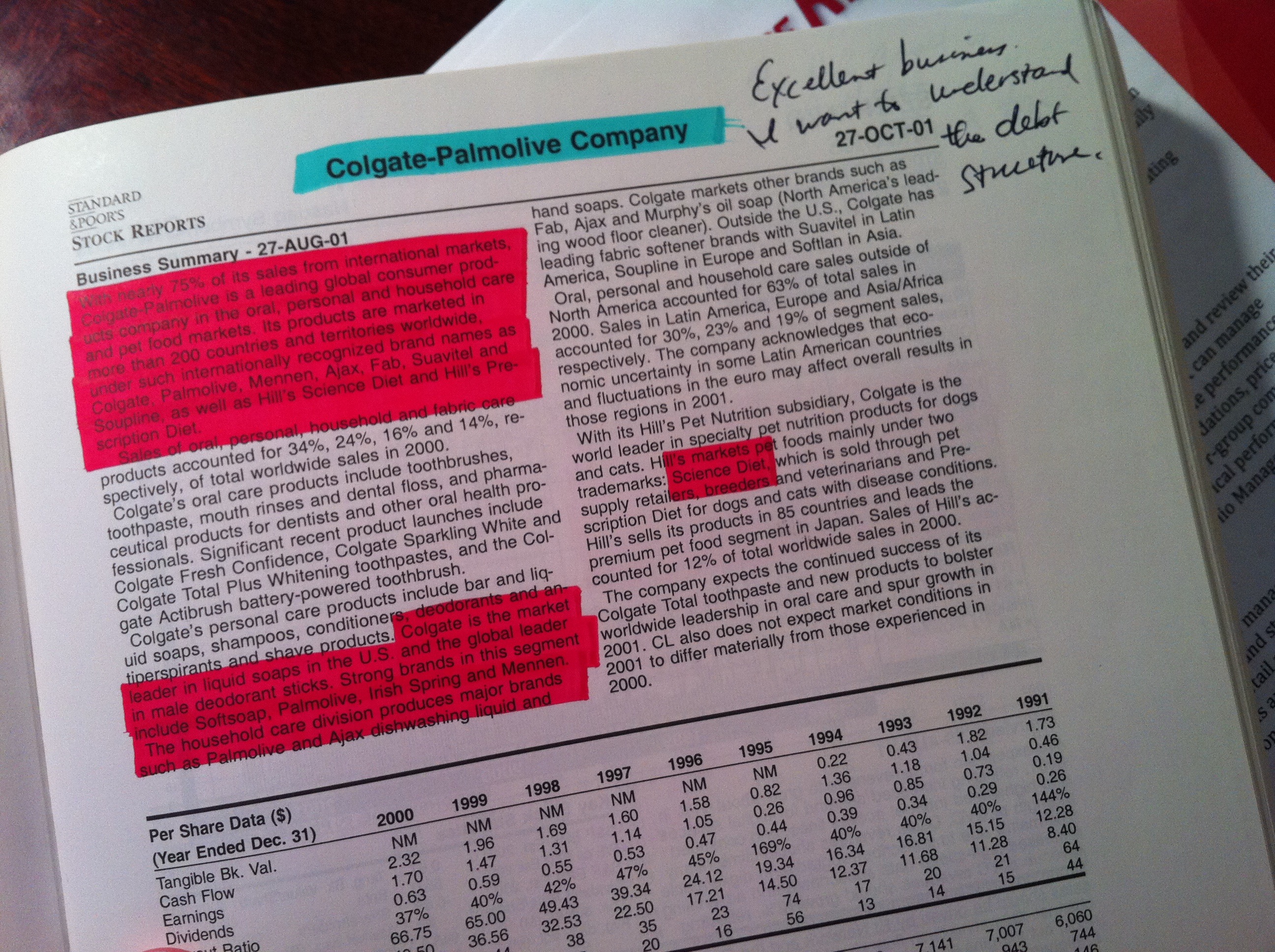I’m still running several weeks behind but one of the things I’ve been working on is a response to a few of the questions submitted by FratMan, whom you’ve seen in some of the mail bag sections I believe. He’s mentioned a few times, such as in the comments sections here and here, that he likes Colgate-Palmolive as a business. In fact, it makes his list of top five stocks he’d want to hold forever.
[mainbodyad]Tonight, I was going through my library searching from some notes about bank custodians for a new family partnership I’m probably going to establish and came across a notated copy of the old Standard and Poor’s 500 guide. I flipped through it and saw the report from August 27th, 2001 and then used the 10-year data record, going back to 1991 with the most recent copy to compile a 20-year history of the stock just for kicks. It’s been a very real winner in a very real way despite the dot-com bubble, the post-September 11th market crash, and the real estate bubble, which lead to the worst recession since the Great Depression. Turns out Colgate toothpaste, soaps like Palmolive, Softsoap, and Irish Spring, cleaning supplies like Ajax, and nutrition products for dogs and cats churn out a lot of cash.
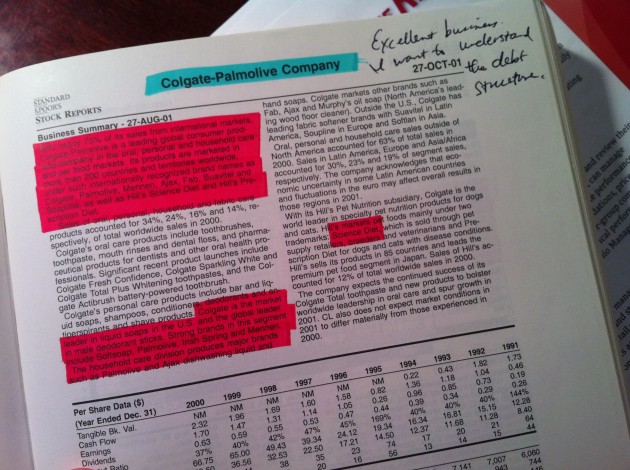
The Colgate-Palmolive report from more than ten years ago ... the teal highlight on the company name meant "excellent business" and was a way for me to go back and order the annual reports of the firms I found interesting so I could study them in-depth.
Twenty years ago, you could have bought a share of Colgate-Palmolive for $10.34. Today, that share is worth $89.01. That is a capital gain of $78.67. In addition, over that same period, you would have collected $16.82 in cash dividends to spend, reinvest, or give to charity.
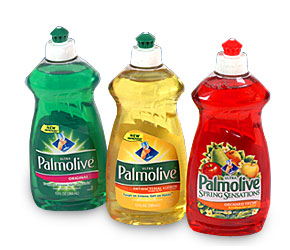 That is a total return of $95.49 on a $10.34 investment, or 12.33% annually without dividends reinvested. But inflation turned $1.00 in 1991 into only $0.62 today, so the total return has a real, inflation-adjusted value of $59.20. That is a real return of 9.11% compounded for twenty years, again without dividends reinvested! You could have spent the cash all along the way.
That is a total return of $95.49 on a $10.34 investment, or 12.33% annually without dividends reinvested. But inflation turned $1.00 in 1991 into only $0.62 today, so the total return has a real, inflation-adjusted value of $59.20. That is a real return of 9.11% compounded for twenty years, again without dividends reinvested! You could have spent the cash all along the way.
To put it in more tangible terms, imagine that you could go back to 1991. You bought 10,000 shares for a total cost of $103,400. Today, those shares are worth $890,100 plus you would have collected $168,200 in cash along the way before taxes, which you could have spent on televisions, cars, additional investments, books, clothes, coffee, tea, movies, home renovations, or whatever else you wanted. The truly die-hard value investors among us could have used it to buy more shares of Colgate-Palmolive to get even more dividends.
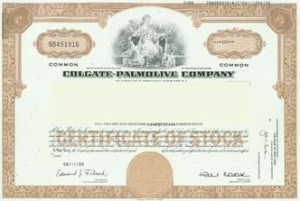 Now, is that going to make you Warren Buffett rich? Not unless you have a pool of money upon which you earn an override or you are dealing with large sums from a successful career. But it can make you rich. In fact, it can make you rank among some of the richest men and women in history, even if Forbes or Fortune never knows your name. If you go through life acquiring assets like that, it isn’t hard to end up with a giant pile of money throwing off cash for you to use. Do it for 40 or 50 years and you could end up being one of those janitors that leaves $30 million to their favorite school or charity.
Now, is that going to make you Warren Buffett rich? Not unless you have a pool of money upon which you earn an override or you are dealing with large sums from a successful career. But it can make you rich. In fact, it can make you rank among some of the richest men and women in history, even if Forbes or Fortune never knows your name. If you go through life acquiring assets like that, it isn’t hard to end up with a giant pile of money throwing off cash for you to use. Do it for 40 or 50 years and you could end up being one of those janitors that leaves $30 million to their favorite school or charity.
That is why I love compound interest.
There were several years in there where the stock fell by 40% or 50%. But the earnings kept climbing ever-higher. All that ultimately counts is the profit you can take out of a business. Your goal is to make sure you pay a fair price for your ownership stake. Overpay, and even the best business can’t help you.
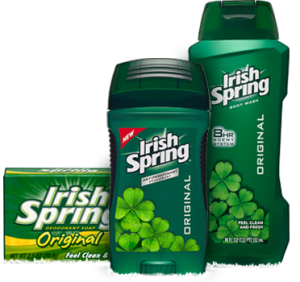 I know it sounds somewhat crazy to those who don’t “get it”, but the idea of being 80 years old and seeing shares of a company like this on my balance sheet, knowing that the annual dividend income is more than what I paid for it, gives me the same feeling that some people describe when they see romantic comedies. Even though I plan on giving almost everything away in the end, it’s about building something and seeing it grow. That is the fun. It’s also about being intelligent, correct, and having subsequent history validate your thesis.
I know it sounds somewhat crazy to those who don’t “get it”, but the idea of being 80 years old and seeing shares of a company like this on my balance sheet, knowing that the annual dividend income is more than what I paid for it, gives me the same feeling that some people describe when they see romantic comedies. Even though I plan on giving almost everything away in the end, it’s about building something and seeing it grow. That is the fun. It’s also about being intelligent, correct, and having subsequent history validate your thesis.
I still don’t own any Colgate-Palmolive – the current 18.57 p/e ratio seems a bit high to me but I can’t say that with any certainty because it’s possible owner earnings exceed reported net income. I think I’m going to order the report. It might make a good inclusion in the KRIP portfolio.
[mainbodyad]


